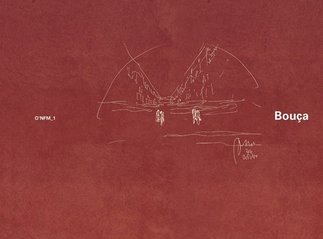Publikation
Bouça
O'Neil Ford Monograph Series, Vol. 1
ISBN: 3803006848
Beiträge von: Brigitte Fleck, Álvaro Siza, Wilfried Wang
Sprache: Englisch
Publikationsdatum: 2008
Umfang: 144 S.,
Format: Pappband, 21 x 30 cm
Resident's Association Housing, Álvaro Siza, Porto 1972-77, 2005-06.
In the history of architecture, for a building to be some three or four decades in the making is not such an unusual occurrence. The Bouça Residents’ Association Housing in Porto by Álvaro Siza (in association with António Madureira) spans thirty-three years from start to finish. The reasons for this delay are numerous. Álvaro Siza, whose oeuvre shows him to be one of the world's most profound architects, has experienced many changes in fortunes.
In the 70s, Álvaro Siza was known in Portugal and admired by a few Spanish and Italian colleagues. Significant competition successes, particularly for the International Building Exhibition in Berlin (1984-7) marked Siza's development in the 80s. By the 90s, Siza's international reputation was unquestioned. After a long period without a commission in Porto itself, Siza's authority in Porto was restored with the completion of the Faculty of Architecture of Porto University in 1985 and the Fundação Serralves in 1999. The awarding of the Pritzker Prize in 1992, the construction of the Portuguese Pavilion at Lisbon's EXPO 98, the steady restoration of the conflagrated Chiado district (1988) in Lisbon throughout the 90s, all served to raise his national stature.
Thus even the municipal authorities could no longer ignore the embarrassment that was the fragmented and run-down first phase of the Bouça Housing scheme, especially at the time of Porto’s role as European Cultural Capital 2001.
This publication presents and appraises the completed project. With the luxury of the monographic format, the entire complex is documented in terms of its design development, its interim status and its final design. Siza’s sketches, many of which are published here for the first time, reveal the steady search for the appropriate solution.
This first volume of the O'Neil Ford Monograph Series, like those that will follow, uses the luxury of hundreds of images on almost as many pages, together with insightful essays, to once again assert the presence of the architectural book in the age of the internet. To this aim the Center for American Architecture and Design (CAAD) and the O'Neil Ford Chair in Architecture at the University of Texas at Austin, School of Architecture have joined forces. Each monograph sets out to document an important work of modern architecture economically, and permanently, in a format that allows the reader to study its contents close-at-hand.
Parallel to the O'Neil Ford Monographs the Center for American Architecture and Design and the O'Neil Ford Chair are launching a sister series entitled the O'Neil Ford Duographs. This latter series gives examples, two at a time, of what is best in architecture today yet overlooked around the world. Each issue will document in some detail one building each by two different architects from a single country. These buildings will be complemented by descriptions from the respective architects and external critics. As Vol. 1 in this series was published Chile. House at Punta Pite by Smiljan Radic, 2003-06/Crypt in the Cathedral of Santiago de Chile, 1999-2006 by Rodrigo Perez de Arce.
In the 70s, Álvaro Siza was known in Portugal and admired by a few Spanish and Italian colleagues. Significant competition successes, particularly for the International Building Exhibition in Berlin (1984-7) marked Siza's development in the 80s. By the 90s, Siza's international reputation was unquestioned. After a long period without a commission in Porto itself, Siza's authority in Porto was restored with the completion of the Faculty of Architecture of Porto University in 1985 and the Fundação Serralves in 1999. The awarding of the Pritzker Prize in 1992, the construction of the Portuguese Pavilion at Lisbon's EXPO 98, the steady restoration of the conflagrated Chiado district (1988) in Lisbon throughout the 90s, all served to raise his national stature.
Thus even the municipal authorities could no longer ignore the embarrassment that was the fragmented and run-down first phase of the Bouça Housing scheme, especially at the time of Porto’s role as European Cultural Capital 2001.
This publication presents and appraises the completed project. With the luxury of the monographic format, the entire complex is documented in terms of its design development, its interim status and its final design. Siza’s sketches, many of which are published here for the first time, reveal the steady search for the appropriate solution.
This first volume of the O'Neil Ford Monograph Series, like those that will follow, uses the luxury of hundreds of images on almost as many pages, together with insightful essays, to once again assert the presence of the architectural book in the age of the internet. To this aim the Center for American Architecture and Design (CAAD) and the O'Neil Ford Chair in Architecture at the University of Texas at Austin, School of Architecture have joined forces. Each monograph sets out to document an important work of modern architecture economically, and permanently, in a format that allows the reader to study its contents close-at-hand.
Parallel to the O'Neil Ford Monographs the Center for American Architecture and Design and the O'Neil Ford Chair are launching a sister series entitled the O'Neil Ford Duographs. This latter series gives examples, two at a time, of what is best in architecture today yet overlooked around the world. Each issue will document in some detail one building each by two different architects from a single country. These buildings will be complemented by descriptions from the respective architects and external critics. As Vol. 1 in this series was published Chile. House at Punta Pite by Smiljan Radic, 2003-06/Crypt in the Cathedral of Santiago de Chile, 1999-2006 by Rodrigo Perez de Arce.
Weiterführende Links:
Wasmuth Verlag GmbH







